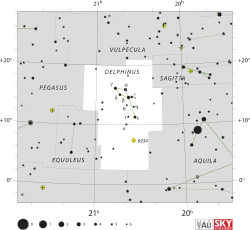Theta Delphini
Theta Delphini, a name Latinized from θ Delphini, is a single[12] star in the northern constellation of Delphinus. It has an apparent visual magnitude of about 5.7,[2] meaning that it is just barely visible to the naked eye under excellent viewing conditions. The distance to this star is approximately 2,050 light years from the Sun based on parallax. It is drifting closer with a radial velocity of −15 km/s.[5]

| |
| Observation data Epoch J2000 Equinox J2000 | |
|---|---|
| Constellation | Delphinus |
| Right ascension | 20h 38m 43.98644s[1] |
| Declination | +13° 18′ 54.4543″[1] |
| Apparent magnitude (V) | 5.69[2] |
| Characteristics | |
| Spectral type | K3Ib[3] |
| U−B color index | +1.71[4] |
| B−V color index | 1.509±0.047[2] |
| Astrometry | |
| Radial velocity (Rv) | −15.09±0.13[5] km/s |
| Proper motion (μ) | RA: 3.068[1] mas/yr Dec.: −0.179[1] mas/yr |
| Parallax (π) | 1.5887 ± 0.0738[1] mas |
| Distance | 2,050 ± 100 ly (630 ± 30 pc) |
| Details | |
| Mass | 5.69[6] M☉ |
| Radius | 125 R☉[7] 88±25[8] R☉ |
| Luminosity | 2,333+1,103 −748[7] L☉ |
| Surface gravity (log g) | 1.3[9] cgs |
| Temperature | 3,986±170[7] K |
| Metallicity [Fe/H] | +0.22[9] dex |
| Rotational velocity (v sin i) | 3.0[10] km/s |
| Other designations | |
| Database references | |
| SIMBAD | data |
The stellar classification of Theta Delphini is K3Ib, which means it is a K-type supergiant.[13] These types of stars form when relatively massive (10 to 30 M☉) stars like B-type main sequence stars run out of hydrogen to fuse and start cooling down.[14] It has been described as a super-metal-rich star because of its high metallicity.[9]
References
- Brown, A. G. A.; et al. (Gaia collaboration) (August 2018). "Gaia Data Release 2: Summary of the contents and survey properties". Astronomy & Astrophysics. 616. A1. arXiv:1804.09365. Bibcode:2018A&A...616A...1G. doi:10.1051/0004-6361/201833051. Gaia DR2 record for this source at VizieR.
- Anderson, E.; Francis, Ch. (2012). "XHIP: An extended hipparcos compilation". Astronomy Letters. 38 (5): 331. arXiv:1108.4971. Bibcode:2012AstL...38..331A. doi:10.1134/S1063773712050015. S2CID 119257644.
- Bidelman, William P. (1951). "Spectral Classification of Stars Listed in Miss Payne's Catalogue of C Stars". The Astrophysical Journal. 113: 304. Bibcode:1951ApJ...113..304B. doi:10.1086/145399.
- Fernie, J. D. (1983). "New UBVRI photometry for 900 supergiants". Astrophysical Journal Supplement Series. 52: 7–22. Bibcode:1983ApJS...52....7F. doi:10.1086/190856.
- Famaey, B.; et al. (2005). "Local kinematics of K and M giants from CORAVEL/Hipparcos/Tycho-2 data. Revisiting the concept of superclusters". Astronomy and Astrophysics. 430: 165–186. Bibcode:2005A&A...430..165F. doi:10.1051/0004-6361:20041272.
- Hohle, M. M.; et al. (2010). "Masses and luminosities of O- and B-type stars and red supergiants". Astronomische Nachrichten. 331 (4): 349. arXiv:1003.2335. Bibcode:2010AN....331..349H. doi:10.1002/asna.200911355.
- Messineo, M.; Brown, A. G. A. (2019). "A Catalog of Known Galactic K-M Stars of Class I Candidate Red Supergiants in Gaia DR2". The Astronomical Journal. 158: 20. arXiv:1905.03744. Bibcode:2019AJ....158...20M. doi:10.3847/1538-3881/ab1cbd.
- Van Belle, G. T.; et al. (2009). "Supergiant temperatures and linear radii from near-infrared interferometry". Monthly Notices of the Royal Astronomical Society. 394 (4): 1925. arXiv:0811.4239. Bibcode:2009MNRAS.394.1925V. doi:10.1111/j.1365-2966.2008.14146.x.
- Malagnini, M. L.; et al. (2000). "Observations and Atmospheric Parameters of Super-Metal-rich Candidates". Publications of the Astronomical Society of the Pacific. 112 (777): 1455. Bibcode:2000PASP..112.1455M. doi:10.1086/317714.
- De Medeiros, J. R.; Udry, S.; Burki, G.; Mayor, M. (2002). "A catalog of rotational and radial velocities for evolved stars. II. Ib supergiant stars". Astronomy and Astrophysics. 395: 97–98. Bibcode:2002A&A...395...97D. doi:10.1051/0004-6361:20021214.
- "tet Del". SIMBAD. Centre de données astronomiques de Strasbourg. Retrieved 15 January 2016.
- Eggleton, P. P.; Tokovinin, A. A. (September 2008). "A catalogue of multiplicity among bright stellar systems". Monthly Notices of the Royal Astronomical Society. 389 (2): 869–879. arXiv:0806.2878. Bibcode:2008MNRAS.389..869E. doi:10.1111/j.1365-2966.2008.13596.x. S2CID 14878976.
- Allen, J. S. "The Classification of Stellar Spectra". UCL Department of Physics and Astronomy: Astrophysics Group. Retrieved 1 January 2012.
- Ekström, S.; et al. (2012). "Grids of stellar models with rotation. I. Models from 0.8 to 120 M⊙ at solar metallicity (Z = 0.014)". Astronomy & Astrophysics. 537: A146. arXiv:1110.5049. Bibcode:2012A&A...537A.146E. doi:10.1051/0004-6361/201117751.